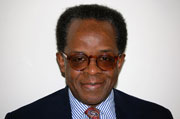
White anger is the new Black
By Lee A. Daniel’s,George Curry Media Columnist
Have you heard? Apparently large numbers of American adults are “angry” a-bout their own circumstances and about where they think the country is headed. For months, numerous politicians, pollsters, and pundits have touted this anger as an important factor in the line-up of who’s supporting who in both the Republican and Democratic presidential primary campaigns.
So, you could say that anger is all the rage (pardon the pun) now in considering the state of American society. Or, to put it in fashion-and political-terms, that anger is the new Black.
But, to be more precise: it’s really white Americans’ anger that’s the new Black.
A survey of 3,000 Americans released this month by NBC News and Esquire magazine, found that 54 percent of whites say they’ve grown more outraged during the past year. That compares with 43 percent of Latinos and 33 percent of Black Americans who say so. Nearly three-quarters of whites say they get angry upon hearing or reading something at least once a day, compared to 66 percent of Latinos and 56 percent of African Americans. Further, while 45 percent of Blacks say the American dream is alive, just 35 and 34 percent of Latinos and whites, respectively, agree.
The survey, appropriately titled “American Rage,” explores what these and other findings mean in limited but nonetheless fascinating detail. Its opening passage declares that from “their views on the state of the American dream (dead) and America’s role in the world (not what it used to be) to how their life is working out for them (not quite what they’d had in mind), a plurality of whites tend to view life through a veil of disappointment.”
But, the survey bluntly states, whites’ expressed anger about these things is the “anger of perceived disenfranchisement – a sense that the majority has become a persecuted minority, the bitterness of a promise that didn’t pan out — rather than actual hardship.” It notes parenthetically that “if anger were tied to hardship, we’d expect to see nonwhite Americans – who report having a harder time making ends meet than whites – reporting higher levels of anger. This is not the case.”
In that regard, the passage concludes: “Indeed, despite having what many would consider a more legitimate case for feeling angry, Black Americans are generally less angry than whites. Though they take great issue with the way they are treated by both society in general and the police in particular, Blacks are also more likely than whites to believe that the American dream is still alive; that America is still the most powerful country in the world; that race relations have improved over the past eight years; and, most important in the context of expectations, that their financial situation is better than they thought it would be when they were younger. Their optimism in the face of adversity suggests that hope, whatever its other virtues, remains a potent antidote to anger.”
The NBC News-Esquire survey, in effect, reaffirms the findings of numerous polls over the years of a prevalence of “optimism” and “hope” among Black Americans. Given the serious problems bedeviling Blacks as a group, some researchers have found this mystifying. But the “mystery” solves itself if one substitutes, as I did in another column several years ago, for “optimism” and “hope,” the word “equanimity.”
“Poise. Aplomb. Equilibrium. Balance. Levelheadness. Presence of mind. Self-assurance. Self-command. These are some of the synonyms for equanimity,” I wrote then. “They are rarely, if ever, used in the public discourse to describe the behavior of any group of Black Americans. Yet Black Americans have always displayed extraordinary poise in their struggle” to overcome the discrimination and injustice they faced in the past and continue to face in the present.
It’s not that they’re not “angry,” as the NBC News-Esquire survey points out. But the Black freedom struggle was built and still rests on anger that is governed by hope, compassion for others, a rejection of violence – and, above all, a commitment to democracy.
That standard makes me wish those conducting this very important survey had asked one additional question of those whites who now view life “through as veil of disappointment:” Where is your patience, your discipline, your poise, your optimism; where is your faith in America?
Lee A. Daniels is a longtime journalist based in New York City. His essay, “Martin Luther King, Jr.: The Great Provocateur,” appears in Africa’s Peacemakers: Nobel Peace Laureates of African Descent (2014), Race Forward: Facing America’s Racial DivideA in 2014 published by Zed Books. His new collection of columns is available at www.amazon.com




Be the first to comment